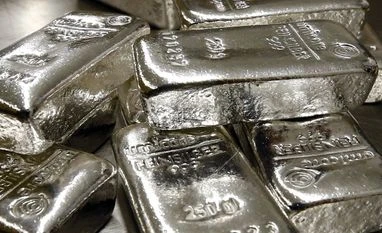Silver has underperformed over the past two years, declining 11.1 per cent. Over the same period, gold has been almost flat (up 1.1 per cent). With several fund houses having launched their exchange-traded funds (ETFs) and fund of funds recently, many investors would be wondering if this is a good time to enter silver.
Recently, HDFC Mutual Fund completed the new fund offer (NFO) of its silver ETF. Edelweiss Mutual Fund has an ongoing NFO for a fund of fund (FoF) that will invest 50:50 in gold and silver ETFs. So far, the mutual fund industry’s total asset under management (AUM) for silver ETFs and FoFs is Rs 1,476.5 crore (AUM of gold ETFs and FoFs is Rs 26,6534.4 crore).
Hit by industrial slowdown
While a smaller portion of the demand for silver comes from jewellery and investment products, the bulk (about 70 per cent) comes from industrial usage. “Silver has underperformed over the past two years due to the industrial slowdown during the pandemic,” says Ajay Kedia, director, Kedia Advisory.
He adds that good supply from mines over the past five-six years has also contributed to price weakness.
Demand from new-age technologies
As industrial growth recovers globally, so could the price of silver. Moreover, there is growing demand for it from new-age technologies. “Silver is used in the production of smartphones, electric vehicles, and solar panels,” says Radhika Gupta, chief executive officer, Edelweiss Mutual Fund.
Silver is undervalued currently vis-a-vis gold. “Currently, the gold-silver ratio is at 92.7, indicating that demand for gold has been higher than for silver. But historically, this ratio has not sustained above the 75-80 level for long,” says Kedia. He expects a mean reversion in this ratio as industrial recovery happens globally and demand from new-age technologies gathers pace.
Silver could also receive a fillip from more restricted supply. “While the price of silver has declined over the past two years, its extraction cost has risen due to labour shortages and other issues. With margins getting compressed, miners could produce less,” says Kedia.
A reversion in the dollar index would also support its price. “If the fear of a recession forces the US central bank to ease up on rate hikes, the dollar index could ease. That would be a positive for silver,” says Gupta.
However, don’t expect a quick recovery. “In his recent statement at Jackson Hole, the US Federal Reserve chairman made it clear he is willing to tolerate a further slowdown in the economy to counter the threat of inflation,” says Vishal Dhawan, chief financial planner, Plan Ahead Wealth Advisors. In such a scenario, industrial recovery could get delayed.
Beware its volatility
Investors entering this asset class should be cognizant of its risks. “It is quite a volatile asset class,” says Dhawan.
Another risk could potentially arise from a demand-supply mismatch. “If the technology were to change, and silver were to be replaced with another metal in solar panels or electric vehicles, its demand would get affected,” adds Dhawan.
Should you invest?
While silver’s near-term outlook is bleak, it could revive in the medium term. “It is an attractive investment for investors with a two-three-year horizon,” says Kedia.
Silver tends to outperform during a bull run. “Just as mid-caps tend to outperform during a bull market in equities, silver does better than gold during a bull run in precious metals,” says Gupta.
Investors who can tolerate its higher volatility should take advantage of the current price weakness to build exposure. “If you already have a high exposure to equities, then restrict your exposure to silver to 5 per cent. But if you have a lower exposure to equities because you are not comfortable with it, invest up to 10 per cent of your portfolio in it,” says Dhawan. He suggests investing with at least a 10-year horizon.
Opt for an ETF with a low expense ratio and low tracking error. If you wish to do a systematic investment plan, go for a FoF.
Unlock 30+ premium stories daily hand-picked by our editors, across devices on browser and app.
Pick your 5 favourite companies, get a daily email with all news updates on them.
Full access to our intuitive epaper - clip, save, share articles from any device; newspaper archives from 2006.
Preferential invites to Business Standard events.
Curated newsletters on markets, personal finance, policy & politics, start-ups, technology, and more.
)